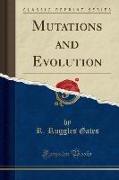- Start
- Mutations and Evolution (Classic Reprint)
Mutations and Evolution (Classic Reprint)
Angebote / Angebote:
Excerpt from Mutations and Evolution
The aim in producing these Chapters was to make them a contribution to current problems of genetics and evolution. The earlier Chapters deal with some of the more recent contributions to genetics, both in plants and animals, particularly as regards questions relating to mutation. This involved comparisons of the mutation phenomena in (Enothera, Drosophila and various other forms. The importance and significance of parallel mutations has also been emphasized. Owing to circumstances for which the writer is in no way responsible it has been necessary largely to curtail the treatment and to omit almost entirely a discussion of the important cytological results concerning mutation in plants and animals which have been attained since my Mutation Factor in Evolution was published in 1915.
In Chapters VI and VII are cited from the recent literature numerous cases of mutations in plants and animals, and also a selection from the great number of presumptive mutations described as new varieties or species in the systematic journals. The history and geographic distribution of these is often of the greatest interest from the point of view of their probable origin, and the mutation theory has undoubtedly been of great value in interpreting such variations both in wild and cultivated forms.
In the last five Chapters more general evolutionary problems have been considered. Some of the corollaries of the mutation theory as regards organic structure, and some of its limitations, have been pointed out. In particular, the contrasts between mutational and organismal characters as regards the structure and distribution of organisms, their relation to recapitulation and such problems as those of adaptation, alternation of generations and inheritance of acquired characters, have been considered in so far as space permitted. The aim has been to show that despite the importance of mutations or germinal changes in evolution, they have definite limitations, and that large fields of organic phenomena will require the neo-Lamarckian factor for their adequate explanation. This is really applying the point of view of Darwin to the modern advances in our knowledge of variation and of the structure, ontogeny, inheritance, distribution, and relationships of organisms.
About the Publisher
Forgotten Books publishes hundreds of thousands of rare and classic books. Find more at www.forgottenbooks.com
This book is a reproduction of an important historical work. Forgotten Books uses state-of-the-art technology to digitally reconstruct the work, preserving the original format whilst repairing imperfections present in the aged copy. In rare cases, an imperfection in the original, such as a blemish or missing page, may be replicated in our edition. We do, however, repair the vast majority of imperfections successfully, any imperfections that remain are intentionally left to preserve the state of such historical works.
Folgt in ca. 5 Arbeitstagen



